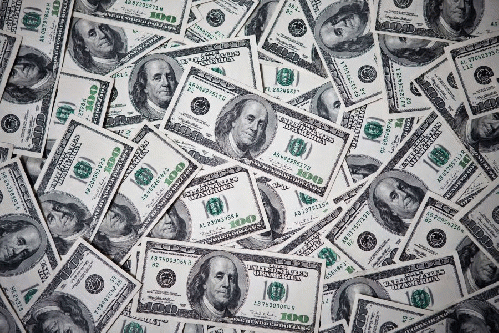
Calling it 'energy' instead of 'bread' probably wouldn't earn you many cool points
(Image by Sergey Rogovets) Details DMCA
In my previous post I drew some parallels between energy and money -- and more specifically, energy and banking -- and pointed out that when money is at stake, the presence of energy is likely lurking somewhere in the shadows. It was mostly hypotheses and observations I was throwing around about energy and banking, but when it comes to energy and money, one can hardly overstate the connection.
Take an Economics 101 class, however, and not only will it be very unlikely that you'll ever hear of energy mentioned in a context besides that of a random commodity within the supply and demand workings of the "free market," but what you will likely hear is that, "gosh darnit, money is an efficiency-laden tool that we humans came up with 'cause we're just so darn smart!" As the story goes, money was ingeniously invented with three primary roles in mind: (a) a medium of exchange, (b) a store of value, and (c) a unit of account. Otherwise put, it (supposedly) has absolutely nothing to do with energy.
Trying to point out to a housemate a few years back -- a housemate who had a degree and masters in economics and was working on his PhD -- that energy actually underpins our entire economy, I was loudly shouted down with "I was never taught that by my professors!" Now, it's possible that my ex-housemate missed out on the most important one-minute factoid and lesson in all of economics because he had to, like, use the urinal or something, but sadly that's probably being too generous. Similarly, it's possible that he had the misfortune of being the son of one of those ign'ant, hee-hawin', country-bumpkin farmers who lack the economic sophistication of a Wall Street bond trader, but that's also not the case. Because what did his father do? He was only an economist at the World Bank in Washington, D.C.
Anyway, a contrary theory to the creation of money being the product of uber-intelligent human beings making the world ever more efficient is given by David Graeber in his insightful book Debt: The First 5,000 Years. As he puts it (while admitting that his description is "a bit of a cartoon version"),
Say a king wishes to support a standing army of fifty thousand men. Under ancient or medieval conditions, feeding such a force was an enormous problem -- unless they were on the march, one would need to employ almost as many men and animals just to locate, acquire, and transport the necessary provisions. On the other hand, if one simply hands out coins to the soldiers and demands that every family in the kingdom was obliged to pay one of those coins back to you, one would, in one blow, turn one's entire national economy into a vast machine for the provisioning of soldiers, since now every family, in order to get their hands on the coins, must find some way to contribute to the general effort to provide soldiers with things they want.
Although I would definitely say that Graeber's understanding of money and markets is closer to the mark than what your average World Bank economist would recite verbatim from what their professor said, which was verbatim from what their professor said, which was verbatim from what their professor said, which was verbatim from what -- whoops, the record's skipping -- there is however one more core truth to money above and beyond that of being used to lord power over others.
For if you really want to get down to the nitty gritty of it all, money comes down to being one thing, and one thing only: a proxy for energy. What's that supposed to mean?
Simply put, it means that the core function of money is that it enables us to command energy -- the energy used to move our bodies with, to power our machines, to feed to domesticated animals whose energy we then use to do work (which nowadays generally means entertaining us), etc. In other words, it might be tough and/or inconvenient, but one can get by without money. You can't get by without energy.
Once this is realized, it's easier to understand the next point, which is that it doesn't really matter what you use as your form of currency, because no matter how counterfeit-proof it is, or how abundant it is, or how scarce it is, or how shiny it is, or how encrypted it is, or whatever, regardless of the quality or quantity that endears a people to a chosen form of currency, nothing about any form of money guarantees that it's going to confer access to needed supplies of energy -- a not-so-small issue to people and societies dependent on enormous supplies of energy to carry out their day-to-day activities, of particular importance in these early peak oil times of ours.
In short, what would be of great service is if economists of all ilk -- as well as the rest of us -- familiarized themselves with the laws of thermodynamics and realized that, at the very least, you don't get something for nothing, and that secondly, there are limits to growth. But that's fodder for another post.
In the meantime, it's best then that we come to realize that no matter how much money is printed, or held back, or lent out, or re-issued, or whatever, it's not going to fix anything when the issue is a lack of energy. That'll be covered in the next post.
Reposted from the article at Allan's website, From Filmers to Farmers.





